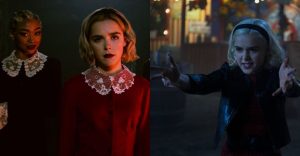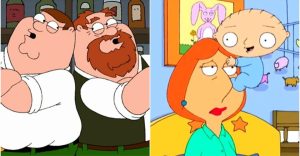Why Dreamcatcher Deserved A Reboot Series More Than The Mist

The Mist may have seen the 2007 Stephen King movie adaptation rebooted for television, but 2003’s intriguing misfire Dreamcatcher was more deserving of another shot. Released in 2007, Frank Darabont’s The Mist delighted critics but received a muted reception at the box office, more than recouping its modest budget but failing to out-earn contemporary competitors like Rob Zombie’s Halloween remake or the bleak vampire horror 30 Days of Night. The siege horror pitted the inhabitants of a small-town against Lovecraftian creatures hidden in the titular mist, but to the surprise of many viewers, much of the movie’s tense screen time was devoted to the evils of religious zealotry as much as the actual monster attacks.
Elevated by a stellar cast including a career-best Marcia Gay Harden, frequent Stephen King collaborator Thomas Jane, and Andre Braugher, The Mist improved on its source novella with a killer ending that alienated audiences but was nonetheless extremely effective. In contrast, Lawrence Kasdan’s earlier Stephen King adaptation Dreamcatcher was released to atrocious critical write-ups in 2003 and struggled to earn back its sizeable budget.
A more complex and convoluted narrative than the sparse The Mist, Dreamcatcher was a sprawling story that bounced between the early years of a group of young teens and their later reunion as middle-aged men. A formative trauma saw them grow distant but a hunting trip in the woods brings the estranged buddies back together – but not without the intervention of alien parasites, evil military officials, and other shenanigans. The Mist was later remade as a disappointing 2017 television series, but since the network Spike had the money and inclination to remake a Stephen King story as a television miniseries, the opportunity should have gone to the maligned but ambitious flop Dreamcatcher for a variety of reasons.
Dreamcatcher Flopped Harder Than The Mist

Grossing only $75 million on a $68 million budget, there is no denying Dreamcatcher fared worse with audiences and critics than The Mist. Despite being seen as something of a disappointment due to its October-adjacent release and subsequent failure to prove an outsized hit, The Mist still earned back its $18 million budget with a solid $57 million haul and earned stellar reviews upon release. In comparison, Dreamcatcher likely didn’t even break even and received a laughably bad critical reception, with legendary critic Roger Ebert talking of its “stunning awfulness” in a brutal dressing down that made Stephen King’s lone directorial effort Maximum Overdrive look like a success. Of the pair, it is clear that Dreamcatcher needed a fix more, something that another adaptation could have provided.
Dreamcatcher Has Unexplored Potential

From the surprisingly cool “Memory Warehouse” scenes to the military-government conspiracy and the effectively gross alien parasites, a common criticism of the overlong Dreamcatcher was that it tried to be too many things at once. This was a problem with the source novel too which at least has a lengthy page count to expend on these subplots, but inevitably shortening the book for a movie runtime hurt the flow of the story. This issue would be helped by the expanded runtime of an entire television season, as proven by Stranger Things’ successful depiction of a similarly intriguing, shadowy government lab conspiracy. However, the extended runtime offered by TV was something that did not help The Mist, largely because its simple source story had already been effectively adapted into a standalone film and did not need more screen time to make sense.
The Mist Didn’t Need Another Adaptation

Like his earlier Stephen King adaptation The Shawshank Redemption, Frank Darabont’s The Mist was critically well-received because it faithfully adapted the novella. The movie even improved on its ending with an added twist King himself admitted he had thought of while writing the story. Like most novella adaptations, The Mist is a self-contained story, meaning the television adaptation soon floundered to reinvent the narrative once the series had covered the original events. After establishing that the monsters are real (and really deadly), all that remains is for the story to slowly ratchet up the tension between survivors stuck inside the supermarket. The Skeleton Crew story is one of King’s less complicated narratives, with none of the timeline-hopping of IT, let alone the wildly complicated plot of Dreamcatcher. King’s more ambitious stories have been condensed into movies and expanded into miniseries before and since, but expanding the already-adapted The Mist again did the simple story few favors.
Television’s Format Would Help Dreamcatcher (But Hurt The Mist)

However, one King story that could have benefited from the extra screen time afforded by a television adaptation was Dreamcatcher. From The Tommyknockers to 11/22/63, most of King’s more ambitious projects benefit from the expansive nature of small-screen adaptation, as shows can take their time establishing the characters where movies have only a couple of hours to communicate an entire novel. The many classic King miniseries adapted from his work in the 90s prove that even trippy stories like The Langoliers could be effectively retold in an episodic format. And so far as King novels go, Dreamcatcher is not short on the weirdness that requires explanation.
Not only does Dreamcatcher’s source novel have hundreds of pages that the adaptation attempted to compress into one movie’s runtime, but King himself also admitted the story was trippier than his usual output due to the painkillers he needed at the time of writing, shortly after he was the victim of a serious car accident. The longer runtime offered by television could have offered time to make sense of Dreamcatcher’s more offbeat elements, with an episode being devoted to the military-industrial complex conspiracy taking place behind the scenes, an episode from each major character’s perspectives, or even an episode or two spent flashing back to their traumatic teen years much like both adaptations of IT.
A long-form version of Dreamcatcher could have done justice to the novel’s surreal story instead of cramming its disparate elements into one incomprehensible movie, whereas a second adaptation of The Mist did nothing but sour the memory of the original movie that had already ably told the story a mere ten years beforehand.
About The Author


















